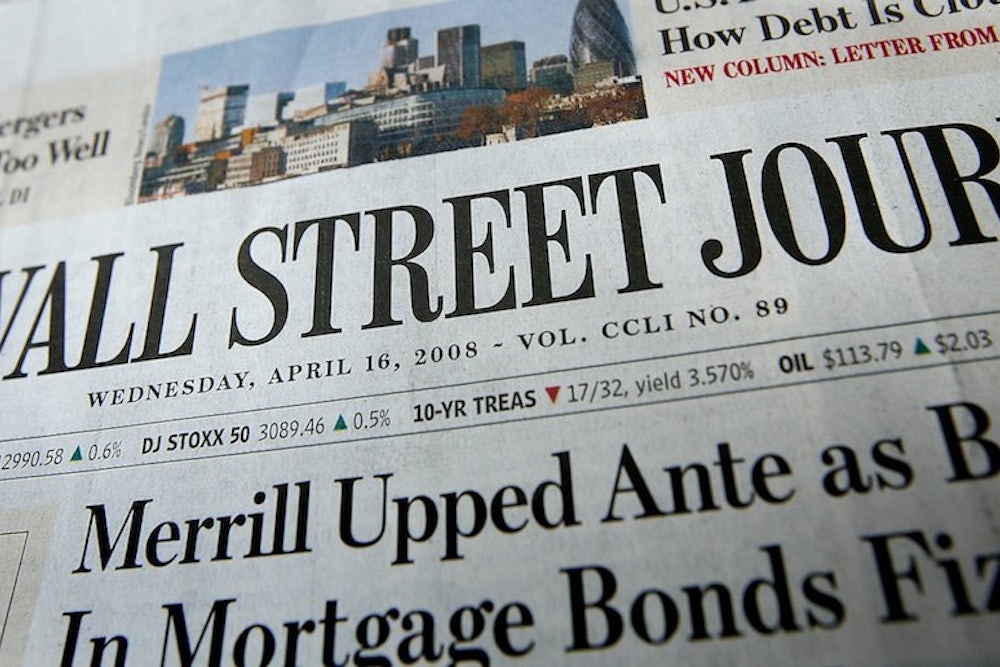The announcement of the Pulitzer Prizes last week was rightly overshadowed by the bombings at the Boston Marathon, which was, of course, only appropriate: No one knows better than serious reporters that hard news trumps ceremony. It’s unfortunate, though, because there was some really terrific work in this year’s class, such as The New York Times’ devastating investigation of Wal-Mart’s widespread bribery of Mexican officials.
It’s also unfortunate because it has meant little scrutiny for a prize that I found truly remarkable: the awarding of the prize for commentary to the Wall Street Journal columnist Bret Stephens. I am a loyal subscriber to the Journal and avid reader of its opinion pages—I find them the most invigorating and best-written form in which to take my daily conservative dosage—and until not long ago I considered Stephens among the better and less predictable of the paper’s stable. But I was nonetheless startled by the prize, because it seemed to overlook entirely an episode that Stephens played a starring role in late last year: the tarring of Chuck Hagel as a raging anti-Semite.
On December 17, as Hagel’s quasi-nomination was hanging in limbo, Stephens wrote a column headlined “Chuck Hagel’s Jewish Problem.” It began like this:
Prejudice—like cooking, wine-tasting and other consummations—has an olfactory element. When Chuck Hagel, the former GOP senator from Nebraska who is now a front-runner to be the next secretary of Defense, carries on about how "the Jewish lobby intimidates a lot of people up here," the odor is especially ripe.
No beating around the bush there. Two months later, Stephens followed up with a column titled “Filibuster Hagel.” This one goes after Hagel for having, while still in the Senate, given a speech at Rutgers University in 2007. What could be wrong with that? Let Stephens explain:
Mr. Hagel's Rutgers speech was co-sponsored by the university's Center for Middle Eastern Studies, chaired at the time by an Iranian-American academic named Hooshang Amirahmadi. The Middle Eastern Studies department was, in turn, generously funded by the New York-based Alavi Foundation, whose nominal purpose is to promote the teaching of Islamic culture and Persian civilization. But Alavi was something else entirely. In December 2009, Farshid Jahedi, its president, pleaded guilty to a count of obstructing justice by destroying documents, after the feds charged the foundation with being a front group for the Iranian government and seized foundation assets in the U.S. worth about $500 million...
As for Mr. Amirahmadi, he is currently running as a long-shot candidate to succeed Mahmoud Ahmadinejad as president of Iran. Though he portrays himself as a reformist, Iranian-Americans who follow him describe him as a "Rafsanjanist" eager to make the regime's case in Washington. In 2009, the New York Post quoted Mr. Amirahmadi as saying that "Iran has not been involved in any terrorist organization," and that "neither Hezbollah nor Hamas are terrorist organizations." At the time of his speech, Mr. Hagel was a member of the Senate's Intelligence Committee. The Alavi Foundation had been under suspicion by the feds since at least 2003. Mr. Amirahmadi makes no secret of his political leanings and ambitions. Did nobody on Mr. Hagel's or the Committee's staff vet his speaking gigs before he gave them? And what does he think today about lending his prestige to Mr. Amirahmadi and his department?
Now that, students, is how you do guilt-by-association. A former senator is tarred for having given a speech at the largest university in New Jersey, all because it was co-sponsored by an academic center at the university that was partly funded by a foundation whose leader pled guilty to federal charges two years after the speech was given, and because the co-sponsoring academic center was chaired by an Iranian-American Rutgers professor who has lived in this country for forty years and has U.S. citizenship but has now gotten it into his head to run a quixotic campaign as a reformist candidate for president of his native country, whose election—which won’t happen, as he probably won’t even be approved as a candidate by Iran's Guardian Council—would be taken as very good news in Washington. This is the sort of connect-the-dot hit-job that made Barack Obama out to be the ideological soul-mate of Bill Ayers.
Stephens’ shots at Hagel were not among the 10 columns in his Pulitzer submission, which included a couple pieces taking the Republican presidential candidates to task and a couple hard shots at Susan Rice’s bid to be Secretary for State. Still, you would think that the people selecting the prizes would’ve been aware of Stephens’ charge of anti-Semitism against Hagel, which put him in the same company as the Washington Post's name-calling conservative blogger Jennifer Rubin and caused a real stir. The jury that selected the three finalists for the category included Beverly Weintraub, an editorial writer for the New York Daily News, and David Leonhardt, the Washington bureau chief of the New York Times. The board that selected the prize winners included Times columnist Tom Friedman, Washington Post columnist Eugene Robinson and Steve Coll, the New Yorker writer (and former Post editor) just named head of the Columbia Journalism School, who recently wrote a very strong critique of Kathryn Bigelow’s “Zero Dark Thirty” for the way it played fast and loose with the facts. These are all serious people who surely had an inkling of the campaign that Stephens was leading to tar Chuck Hagel with one of the most heinous labels of all, just weeks before the prize was awarded. Pulitzer deliberations are private, so I don't expect a full accounting. But still, the question needs to be asked: Did no one raise an objection?
Follow me on Twitter @AlecMacGillis
